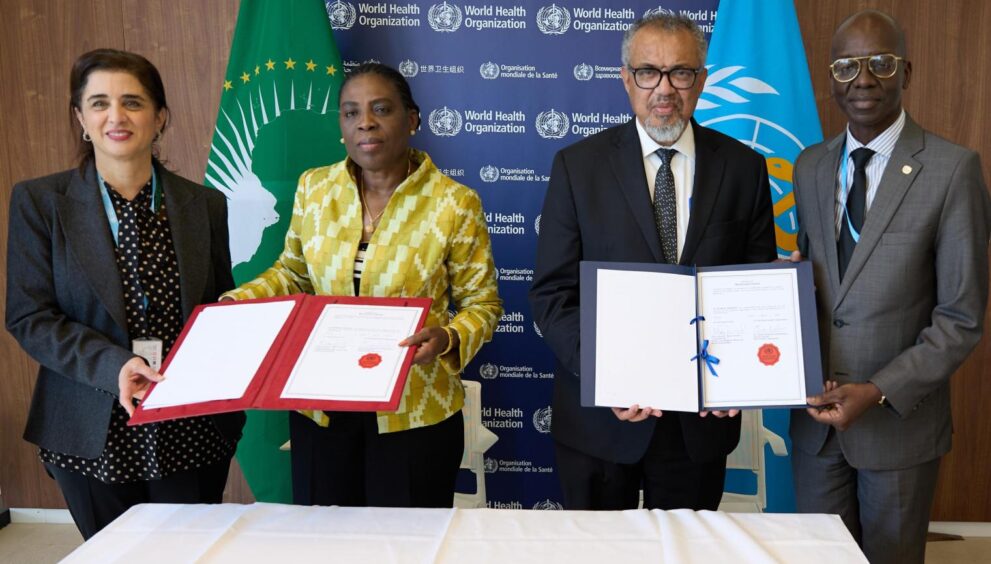The African Union (AU) and the World Health Organization (WHO) have reasserted their long-standing collaboration by renewing their Memorandum of Understanding (MoU), marking what many experts see as a critical recalibration of health diplomacy, accountability, and sustainability on the African continent. Signed on the sidelines of the 78th World Health Assembly in Geneva in May 2025, the updated agreement comes at a pivotal moment in global health governance and reflects the determination of both institutions to advance universal health coverage, bolster regional health systems, and ensure no population is left behind in the wake of dwindling global health aid.
Ambassador Amma Adomaa Twum-Amoah, AU Commissioner for Health, Humanitarian Affairs and Social Development, who signed the agreement on behalf of His Excellency Mahmoud Ali Youssouf, Chairperson of the African Union Commission, framed the partnership as a turning point in regional health policy.
“This Agreement marks a new chapter in AU–WHO cooperation. By working together more closely, we can better respond to the health needs of our populations and ensure that no one is left behind "
Ambassador Amma Adomaa Twum-Amoah

Emphasizing a shift from crisis response to proactive governance, she added, “We need to move from budgeting for survival to planning for health sovereignty,” highlighting the AU’s renewed ambition to chart its own course in health strategy implementation.

The partnership was equally hailed by WHO Director-General Dr. Tedros Adhanom Ghebreyesus, who signed on behalf of his organization. Aware of the stark reductions in bilateral development assistance, Dr. Tedros acknowledged the agreement’s timeliness, stating, “This renewed agreement comes at a critical time, as cuts to bilateral aid imperil the health of millions in Africa.”
For him, the updated MoU encapsulates a collective vision for the future. “It reflects our determination to translate our partnership into tangible results for the people of Africa, and support countries to leave behind the era of aid dependency and transition to sustainable self-reliance.”
The new agreement builds upon the foundation laid by the 2019 MoU but expands its reach by streamlining inter-agency collaboration across all AU institutions. It aligns WHO’s technical and normative leadership with the AU’s policy-making prowess, especially in view of Africa’s growing influence in global governance, notably through its recent integration into the G20.
The revised MoU outlines a renewed commitment to key pillars of Africa’s health agenda, including reproductive, maternal, neonatal, child, and adolescent health; communicable and noncommunicable disease control; nutrition and food security; digital innovation; and health systems resilience in emergencies.
One of the most striking features of the MoU is its integrative ethos. It not only solidifies WHO’s commitment to the African Union’s institutional health frameworks but also places the AU’s Department of Health, Humanitarian Affairs and Social Development at the heart of the continent’s health transformation.
By reaffirming joint action on regulatory harmonization, local pharmaceutical manufacturing, traditional medicine, and domestic health financing, the agreement signals a shift away from externally imposed models toward more contextually grounded, sovereign public health governance.
Moreover, it renews support for landmark AU-driven initiatives like the Campaign on Accelerated Reduction of Maternal Mortality in Africa (CARMMA Plus 2021–2030) and the Addis Ababa Declaration on Immunization. These campaigns are considered vital for building long-term health equity on the continent. By integrating such frameworks into the WHO-AU partnership, the MoU represents a move towards results-based accountability and regional ownership of health strategies.
The timing is deeply significant. With health emergencies multiplying and development aid contracting, African nations are being called to build resilience into their health systems. By aligning their political will and technical resources, WHO and the AU are signaling to the world that African health challenges must be addressed through cooperation, not dependence.
As the AU increasingly asserts its voice in global fora and WHO refines its multilateral partnerships, this renewed agreement is more than diplomatic formality; it is a blueprint for the continent’s health sovereignty.

“ We are proud to stand with the African Union in driving forward the health priorities of the continent ”
Dr Tedros Adhanom Ghebreyesus
This renewed MoU is not only a reaffirmation of solidarity but also a declaration of shared resolve: to confront the escalating health needs of Africa with coordinated action, visionary leadership, and sustainable investments that speak to the future of a healthy and self-reliant continent.




